Study: What Employers Are Looking for in HR Positions
Note: This post was written in 2014 and is based on 3-year-old job listings.
According to the U.S. Bureau of Labor Statistics, the number of human resources (HR) manager positions is set to grow 13 percent by 2022, while HR specialist positions are projected to grow 8 percent. So, how can those in the HR field capitalize on this growth?
To help current and aspiring professionals seeking HR positions better understand the job market and how to ascend in their careers, Software Advice set out to learn what the ideal candidate looks like straight from the source: the job posting.
We analyzed 300 U.S. job openings for primarily upper-level HR positions posted in April and May of 2014. Here, we reveal which titles are most popular, which have the highest barriers to entry and what will be required of potential applicants to land their dream job in this growing field.
Key Findings:
HR job titles are changing to reflect a more business-focused HR department.
Professional in Human Resources (PHR) and Senior Professional in Human Resources (SPHR) certifications are by far the most desired.
Annual compensation for HR jobs is $60,000—well above the national average for all occupations.
Changing Titles Reflect Emphasis on Business Processes
In order to research how candidates can climb the HR ladder, we combed through 300 job listings returned when searching for “HR manager.” Unsurprisingly, this title was the most common in our data set (although our search also returned jobs for various levels of HR professional). However, there was an interesting finding: the third most common job title in the search for open HR manager positions was “HR Business Partner.”
Much has been written recently regarding how the role of HR is changing to become more business-focused, and it seems that companies are beginning to reflect this trend in their job titles. Twelve percent of companies said they were looking for either an HR Business Partner (HRBP) or a Senior HR Business Partner, which the Society for Human Resources (SHRM) defines as someone who:
“…aligns business objectives with employees and management in designated business units. The HRBP serves as a consultant to management on Human Resource-related issues. […] The HRBP maintains an effective level of business literacy about the business units [sic] financial position, its mid-range plans, its culture and its competition.”
HR Job Titles
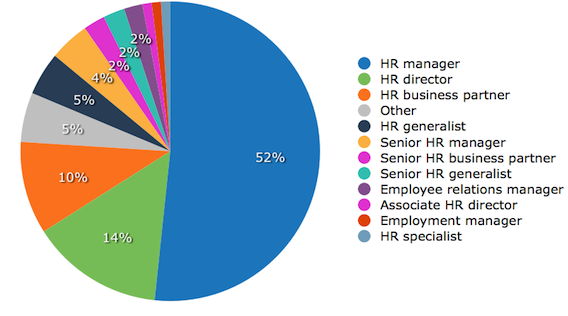
In comparison, an HR manager is defined as someone who is “responsible for hiring new employees, supervising employee evaluations, mediation between employees and bosses as necessary and general overseeing of the personnel department.” The HRBP, as compared to the more traditional HR Manager title, is therefore much more focused on business strategy.
An awareness of how HR fits into the larger business processes of organizations is becoming increasingly requested from employers—and this trend is reflected in other areas of this report, as well, such as preferred areas of study and requested certifications.
Most HR Jobs Require a Bachelor’s Degree
As is the case for most white-collar jobs, a bachelor’s degree was needed in order to be considered for the majority of the HR jobs analyzed in this study (85 percent).
However, it should be noted that 11 percent of job listings did not specify that any minimum education was required to apply. Given that large companies like Google no longer require an undergraduate degree, this may be a sign that the trend towards experience and skills over a four-year education is spreading to the HR profession.
Required Education
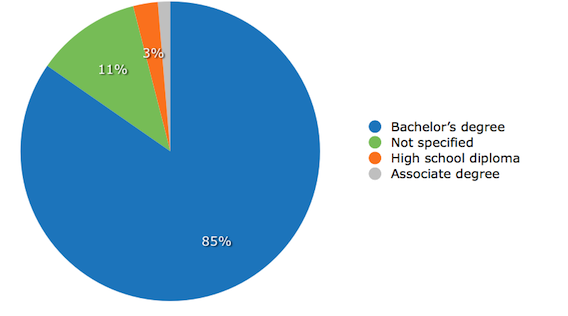
Although 11 percent of the job listings analyzed in this study did not specify that any degree was required, some job titles were more likely to require a four-year college degree than others. HR specialists—the most entry-level position included in the analysis—were the least likely to require a four-year degree, with one-third of HR specialist job postings requiring only a high school diploma.
Degrees Required by Title
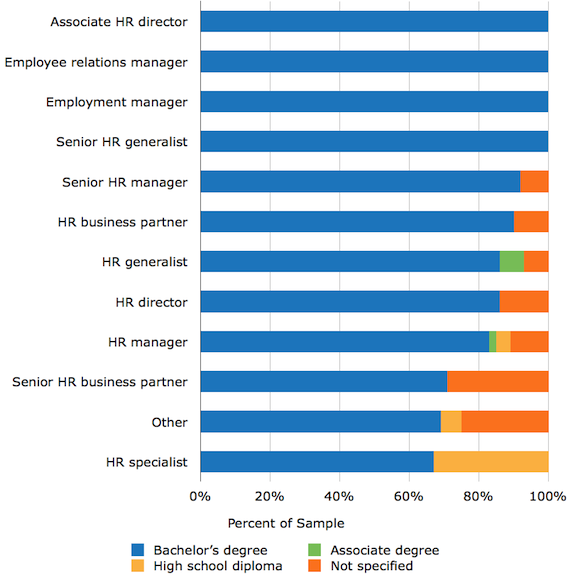](https://software-advice.imgix.net/wordpress/blog_images/degrees-required-by-title.png)
In addition to analyzing what level of education was required, we also wanted to see what level of education was preferred. While 67 percent of the listings included in this analysis did not specify any level of preferred education, almost one-third of the listings requested an advanced degree: either a master’s or a Master of Business Administration (MBA).
Preferred Education
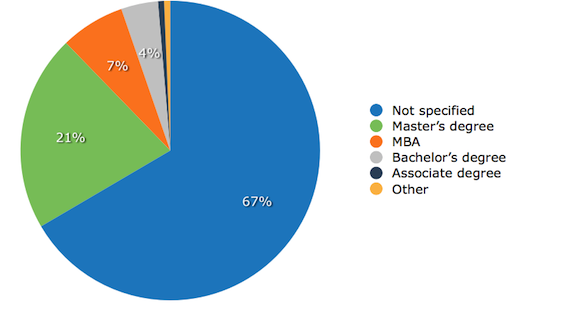
Of the job listings that did require an undergraduate degree, many specified a preferred area of study. Unsurprisingly, human resources was the top-requested undergraduate area of specialization, while business administration was the second most requested.
This aligns with our previous research into the educational backgrounds of the 100 most successful HR professionals in the world. If you want to get ahead in the HR field—at any level of responsibility—a strong grasp of HR and business will go a long way.
Top-Requested Areas of Study
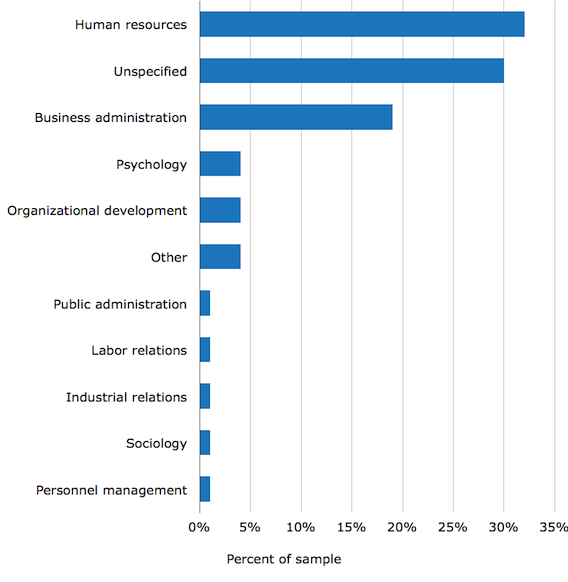
SPHR or PHR Certifications Are the Most Requested
In addition to a bachelor’s degree, HR certifications were an additional credential required or preferred by many employers. In fact, 42 percent of companies noted that an HR certification was either preferred or required.
HR Certification Specifications
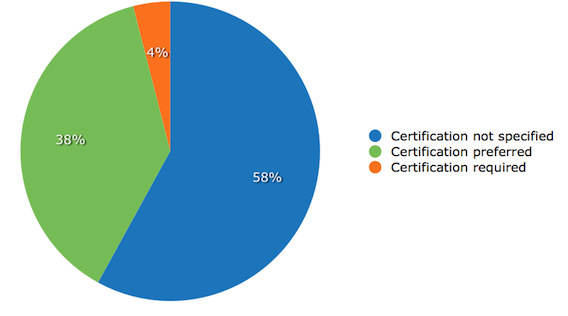
However, while 58 percent of job listings did not require a certification, certain job titles were more likely to request or prefer some type of certification. For instance, HR professionals seeking a job as an HR business partner are much more likely to need an HR certification in order to obtain work. On the other hand, the HR specialist and employment manager positions in our analysis did not require or request any type of certification.
HR Certification Specifications by Job Title
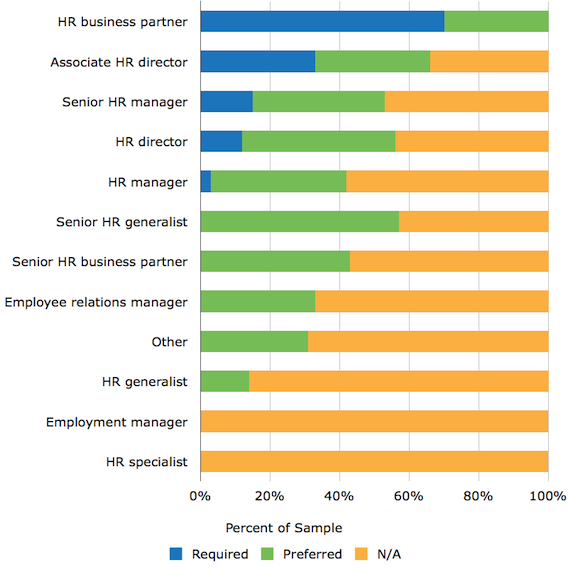
Of the job listings that either preferred or required some form of HR certification, Professional in Human Resources (PHR) or Senior Professional in Human Resources (SPHR) certifications were the most frequently mentioned.
Top-Requested HR Certifications
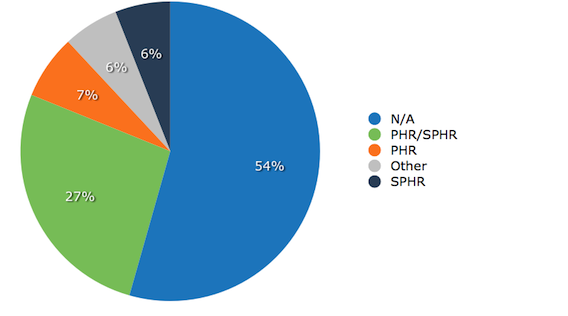
Interestingly, a Six Sigma certification, which is not exclusive to the HR profession, also appeared several times in the preferred qualifications—for the “HR Manager” title specifically.
Six Sigma professionals are trained to employ techniques—such as quality management and statistical analysis—to improve business processes. While only 1 percent of the job listings requested this credential, it is further indication that HR professionals are increasingly being expected to have a thorough knowledge of business processes outside of traditional areas of HR expertise, such as compensation and benefits management.
One-Fourth of Companies Request Knowledge of HR Software
Meanwhile, approximately one-fourth of employers specified that they would prefer applicants with knowledge of some form of Human Resources Information Systems (HRIS) software knowledge.
HRIS Software Knowledge Requirements
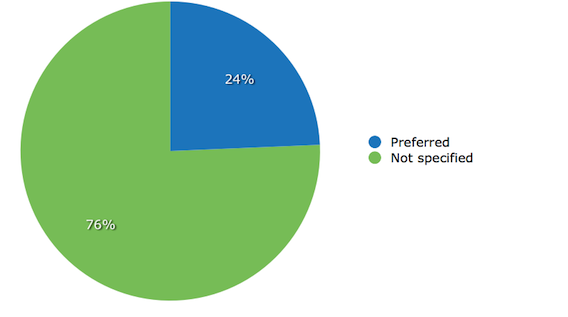
As you can see, when employers specified a certain type of HRIS system, they most often requested that applicants have a working knowledge of Peoplesoft, ADP, SAP or Oracle.
Top-Requested HRIS Software Systems
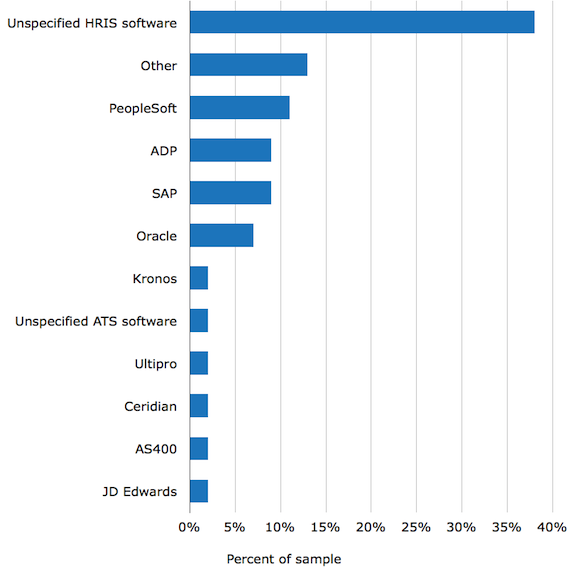
Although only one-fourth of employers requested that applicants have HR software-related knowledge, for potential applicants to human resources jobs, an awareness of the most popular HRIS software programs would be a plus for many employers.
HR Managers Must Have at Least 3 Years of Experience
As is the case for across most white-collar professional, salaried occupations, applicants will need at least a few years of experience to be considered for an upper-level HR department role at most companies. For over half of the job postings analyzed in this report, employers requested at least 3-5 years of experience.
Experience Required
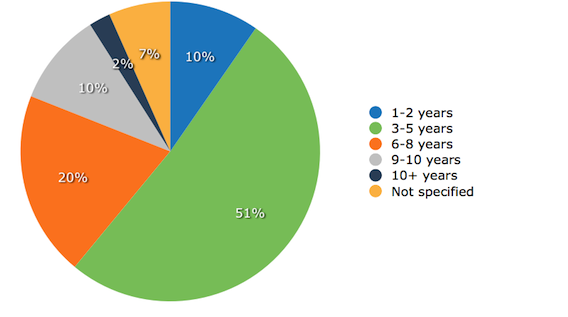
As is to be expected, more senior-level roles—such as HR Director and Senior HR Manager—required more experience. The title requiring the most years of experience was Senior HR Business Partner, with a minimum requirement of 6 years of experience. Meanwhile, HR Specialist and HR Generalist roles were more likely to require fewer years of experience.
Experience Required by Title
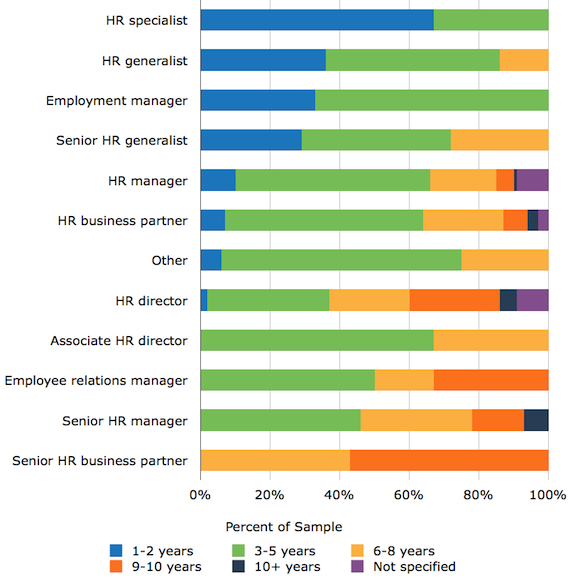
HR Manager’s Median Annual Wage is $60,000
Surprisingly, very few postings provided any information regarding a candidate’s potential salary. Only 24 listings, or 8 percent of the job postings included in this analysis, included salary information.
However, when we analyzed the salaries in postings that did provide compensation information, we found that $60,000-69,999 was the median projected income of potential applicants to these jobs. In addition, 60 percent of the HR jobs we analyzed paid $60,000 or more annually.
Salaries of HR Job Listings
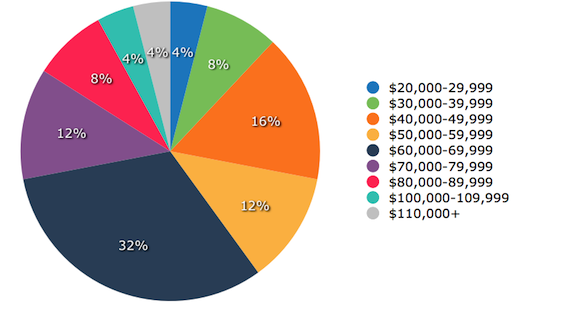
While this salary is higher than the Bureau of Labor Statistics’ calculated median annual wage for all occupations of $34,750, it is significantly lower that the BLS’s projected median annual wage for HR professionals: $99,720. The only postings we found offering a wage of around $100,000 were for HR Director and HR Generalist positions.
Methodology
This study was conducted by pulling data from 300 national listings returned from Indeed.com using a keyword search for “HR manager.” It should be noted that although some job listings did not list degree or certification requirements, job seekers may nonetheless find there is a competitive advantage to having these—or, conversely, a disadvantage to lacking degrees and certifications.
To further discuss this report, or obtain access to any of the charts above, feel free to contact me at erin@softwareadvice.com.
Explore HR categories:
[
](https://www.softwareadvice.com/hr/small-business-payroll-comparison/)